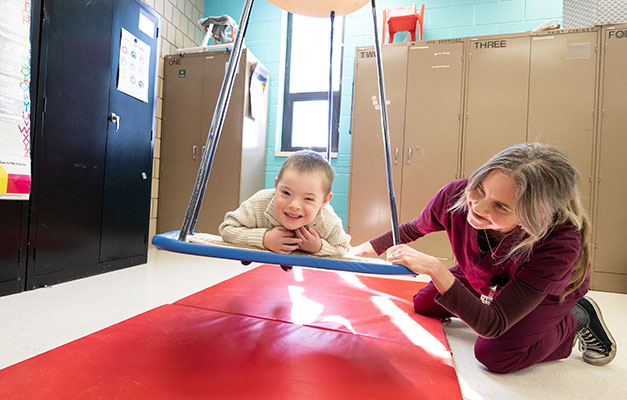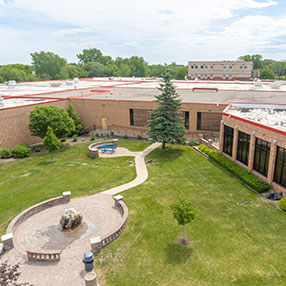Occupational therapy is a vibrant, growing profession that makes it possible for people, young and old, to regain independence and to enjoy life to its fullest. By choosing a career in occupational therapy, you will make a difference and Anoka Technical College can help you get there.

Help people, young and old, regain independence

Hands-on training from industry experts

High-demand career with a 24.4% growth rate
Industry & Career Outlook
Potential Jobs:
- Occupational Therapy Assistant
- Life Enrichment Coordinator/Activity Director
- Behavior Specialist
Salary Information:
Median Wage: $30.30 per hour
Top Earners: $34.79 per hour
Information provided is for Minnesota. See current data at mn.gov/deed.
Hear from Our Students
Other Program Info
ACOTE Accreditation
The Occupational Therapy Assistant program at Anoka Technical College is accredited by the Accreditation Council for Occupational Therapy Education (ACOTE) of the American Occupational Therapy Association (AOTA), located at 7501 Wisconsin Avenue, Suite 510E Bethesda, MD 20814, (301) 652-AOTA. www.acoteonline.org
Graduates of the program are eligible to sit for the national certification examination for the occupational therapy assistant administered by the National Board for Certification in Occupational Therapy (NBCOT). After successful completion of the exam, the individual is a Certified Occupational Therapy Assistant (COTA). Most states require licensure in order to practice. However, state licenses are usually based on the results of the NBCOT Certification Examination. A felony conviction may affect a graduate’s ability to sit for the NBCOT certification exam or attain state licensure.
Application Dates
Application period for fall semester 2025 begins Monday, Dec. 2, 2024 at 9 am.
Admission Guidelines
Steps to Admission to the Occupational Therapy Assistant (OTA) Program
You must complete all steps of the admissions process to be admitted into the Occupational Therapy Assistant program. Please read the full explanations below this checklist and review OTA Program Admission Requirements, Timeline.
- Apply to Anoka Technical College and be admitted to the college
- Complete the ACCUPLACER Assessments
- Complete the Test of Essential Academic Skills (ATI-TEAS)
- Attend mandatory program Information Session. RSVP
If you are interested in the OTA Program at Anoka Technical College, the following changes are made for summer admission to the program. Email Enrollment Services at enrollmentservices@anokatech.edu to obtain a link for the recorded information session. Please note the transcript may not be completely accurate in transcription.Listen to the recorded information session. When complete, email Barb Kloetzke at bkloetzke@anokatech.edu and she will email you a survey to fill out. Once you return the survey, you will be emailed a certificate of attendance.
- Apply to the OTA Program using the supplemental program application
Submit your completed OTA admission packet once you receive you certificate of attendance for watching the information session and completing the survey.You will then complete the college's online orientation and register for classes before the mandatory OTA Program Orientation on Thursday, August 14, 2025, from 3-5:30pm in room 126. A waitlist will be established for the fall 2025 class, if needed.
Additional Resources
Take a virtual tour and review the list below to get an idea of what it's like to be a student at Anoka Tech.
Info for Current Students
Certification Exam
Graduates of the Occupational Therapy Assistant program will be eligible to take the national certification examination for the occupational therapy assistant administered by the National Board for Certification in Occupational Therapy (NBCOT). After successful completion, graduates will be Certified Occupational Therapy Assistants (COTA).
Most states, including Minnesota, also require licensure in order to practice occupational therapy. However, state licenses are usually based on the results of the NBCOT Certification Examination. A felony conviction may affect a graduate's ability to take the NBCOT certification exam or attain state licensure.
Pass Rates on the National Certification Exam
NBCOT pass rates on the Certification Exam are indicated above and can also be accessed at nbcot.org.
Graduation Rates
| Graduation Month/Year |
Students Entering the Program |
Students Graduating | Retention Rate |
|---|---|---|---|
| May 2022 | 28 - August 2021 | 22 | 78.6% |
| May 2023 |
21 - August 2022 |
17 |
81% |
| May 2024 |
21 |
17 |
81% |
| Three year total (2022, 2023, 2024) |
70 | 56 | 80.2% |
Occupational Therapy Assistant Program Costs*
| Admission Assessments (if required) Test of Essential Academic Skills (TEAS) Accuplacer: 1st test free |
|
||
|---|---|---|---|
| Tuition: General Education 15 credits (online or seated) Online cost: (COMM 1500 is only offered online) Seated course: |
|
||
| Tuition: OTA Program 56 credits 54 credits are seated 2 credits online Total OTA tuition cost |
|
||
| OTA Course Fees (costs subject to change) | $551.60 | ||
| Textbooks, Subscriptions and Graduation Regalia (Cap and Gown) (approximately) | $2,100 | ||
| Professional Memberships | $175 | ||
| TherapyEd study course fee (optional) | $140 | ||
| Transcript Fee | $7.50 | ||
| Certification Exam (after graduation- online application) | $515 | ||
| MN License (after graduation) | $105 | ||
| Miscellaneous Costs: Fieldwork housing, transportation, food; or other supplies for class |
varies | ||
| Total: (costs may vary and are subject to change) | $18,668 | ||
*Total cost for the OTA Program will vary depending on a variety of factors. All costs are subject to change due to purchasing agreements and curriculum updates. Tuition costs include parking, technology and student association fees.
Get Help to Pay for College
Over 90% of full-time undergraduate college students at Anoka Tech receive some type of financial aid in the form of grants, scholarships, loans or work-study.
Beginning with the second semester of the program, each student will participate in a Level I Fieldwork placement. The second rotation of Level I Fieldwork will take place during the third semester. Two Level II Fieldwork Placements will take place in the fourth semester. These experiences will be assigned from a wide variety of facilities including outstate and local hospitals, extended care facilities , school districts, day treatment centers, residential facilities and other community agencies.
Enrollment in the fieldwork classes may be limited due to the availability of fieldwork sites. Possible opportunities for out of state fieldwork experiences may be arranged. Students may be expected to travel up to 275 miles due to availability of fieldwork sites.
Before starting the Level II Fieldwork , all required course work of the OTA program must be completed with a minimum grade of a "C," and the student must have a 2.0 grade point average. Level II fieldwork must be completed within 12 months of completing the required academic coursework.
Prior to these experiences, the student will:
- Complete a Health Information sheet
- Sign a Hepatitis B form
- Receive a Mantoux test (a positive result requires a chest x-ray)
- Complete a background study
- Other items as assigned
Prior to starting the Level I Fieldwork, the student will:
- Secure a current CPR for the healthcare worker card.
An individual who is disqualified from having direct patient contact as a result of the background study, and whose disqualification is not set aside by the Commissioner of Health, will not be permitted to participate in the fieldwork experiences.
Transportation to fieldwork facilities will be the responsibility of each student. Some of the facilities may be reached by public transportation.
Students are expected to be professional regarding their attitude, behavior, and appearance. The student will be required to get a student I.D. card and carry professional liability insurance. Student professional liability insurance are purchased by the college and paid through student course fees. Students have the option to purchase liability insurance on their own.
Minnesota state law requires that any person who provides services that involve direct contact with patients and/or residents at a health care facility have a background study conducted by the state.
ACOTE® accredited occupational therapy and occupational therapy assistant educational programs satisfy the states’ educational requirements in all states, the District of Columbia, and Puerto Rico. Students graduating from an ACOTE® accredited occupational therapy and occupational therapy assistant educational program are eligible to take the National Board for Certification in Occupational Therapy (NBCOT) certification exam and apply for licensure in all states, the District of Columbia and Puerto Rico. For more information regarding state qualifications and licensure requirements, please refer to the AOTA State Licensure webpage.
In the News

Occupational Therapy concepts of total wellness applied in Community Practice course

After job loss, foundation scholarship helps Occupational Therapy Assistant program student succeed
Start Dates:
Fall semester: August




